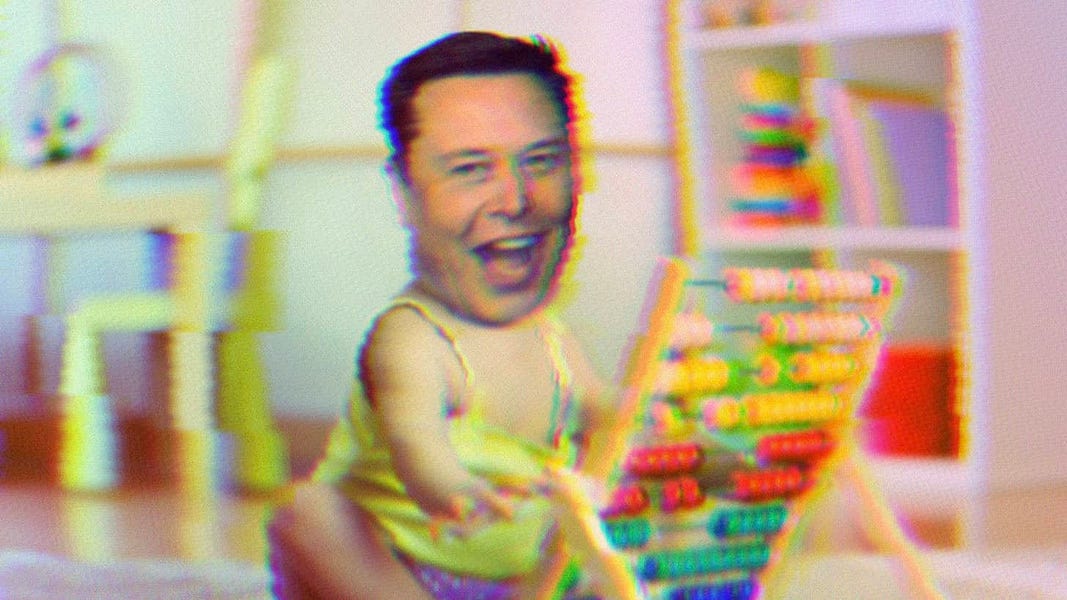Elon Gated: Billionaires and Their Toys
 Image Description: Composite image of Elon Musk's head on a baby's body. The baby is playing with an abacus.
Image Description: Composite image of Elon Musk's head on a baby's body. The baby is playing with an abacus.
I don’t like Elon Musk. You may not either.
Musk is a bundle of inconsistencies. He’s a shameless self-promoter and an asshole. And none of this matters. But we should review the tale of the tape for a moment.
His companies have received an aggregate of $4.9 billion in subsidies over the years, and his SpaceX company hit the big time with a $1.6 billion contract from NASA. Yet he maintains he is a libertarian decidedly against any form of government intervention in business.
His companies are known to be hotbeds of racism. After multiple reports of the horrific treatment of ethnic minorities in his organization and seeing a jury award a single plaintiff $137 million in damages for how he was denigrated in the workplace, Musk sent a memorandum to his employees telling them to develop “thicker skin.” The $137 million was a reflection of the jury’s horror at the proven allegations, though it was later reduced to $15 million by a federal judge.
Musk’s detractors like to say that he’s far from self made, having come from a wealthy South African mining family. Fair enough. But there are plenty of wealthy born businesspeople who never accumulate the type of wealth Musk has. His earliest venture sold for a handsome sum, netting him a cool $22 million. He then went on to invest and run a company that ultimately merged with Peter Thiel’s company to become PayPal. And, even though he was ousted from the company, he retained his shares and walked away with $180 million when it eventually sold as well. (Source)
Musk sunk the proceeds from these sales into Tesla, then a startup, and SpaceX. Both would prove to be incredibly successful gambles, for which he deserves enormous credit. His vision, and wealth to back it up, enabled him to opportunistically invest in emerging sectors, and it paid off big time. You can be angry at that or anything that I’ve just said, but absent your or my feelings about any of it, these are the cold hard facts about Elon Musk.
B’also… He’s probably racist or, at a minimum, doesn’t give a fuck and therefore enables and supports a culture of racism. He invented nothing, but invested very, very wisely in meaningful technology companies that were built by others. He’s a loose cannon and has characterized himself as a libertarian and a socialist, which either means he’s a charlatan or doesn’t understand words.
And now he’s buying Twitter. Good for him. Let’s talk about it.
There are two bits of folly when it comes to talking about Elon Musk. One, is trying to convince his legion of obsessed followers that he’s anything but a genius or a savior of some kind. The other, is trying to criticize billionaires and opine over their worth in the public consciousness in this country. Americans are obsessed with wealth and always have been. Pursuing these two angles distracts from the critical issue at hand, which is how we continue to promote a system that allows for the creation of billionaires that can leverage such enormous influence.
So what does the purchase of Twitter portend for the country?
The Twitterverse is relatively small. It’s filled with elites, media members and trolls. The broader consumer world doesn’t actually fuck with Twitter. To wit, Facebook can claim ¼ of the planet with more than 2 billion users (plus another billion if you include Instagram), Snapchat can have nearly 320 million daily active users, yet appear inconsequential to anyone over 30, while Twitter—which Americans say they use less than LinkedIn—has only 200 million, yet disproportionately drives political and cultural narratives.
What makes it influential is the amplification by the media and the attention paid to the most outlandish Tweets, to say nothing of journalists wasting a colossal amount of time scrolling for perspectives that largely don’t exist in the real world. So where does the responsibility lie? In this sense, it’s the media that bears greater responsibility for how influential Twitter is, which they’ll rarely, if ever, acknowledge.
According to a survey of media usage last year, only 23 percent of Americans said they actually use Twitter, and only 13 percent said they use it for news. Twitter’s apparent influence is remarkable when you consider how few Americans actually engage with it.
What observers of journalism, politics, Wall Street and everywhere in between are pondering is what this means in terms of free speech and what effect this will have on our politics.
A couple of truisms:
- True: The 1st Amendment doesn’t apply to privately owned businesses.
-
Also True: Social media as an amplification tool shouldn’t be devoid of “social” responsibility.
The friction lives between these two truths, and we’re not prepared to address it in a beneficial or meaningful way.
Of course, Musk taking Twitter private, which is expected, would do away with the facade of boardroom oversight. All you have to do is look at Zuckerberg’s monopolistic control of Facebook to know that board members are only there to give the perception that Facebook, or Meta, or whatever the fuck it’s called is looking out for society’s best interest—if they even care in the first place.
Encouraging “free speech” on the platform, as Musk has touted, means that lies will be given equal weight to the truth, hateful rhetoric and bullying (which Musk himself engages in) will be tolerated and the worst impulses of society will be laid bare for all to see—if it hasn’t already. While it’s problematic, to say the least, it’s hardly a departure from how these all-powerful social media platforms have operated for some time now.
Just add another self-important megalomaniac with aspirations of colonizing the cosmos to the growing list of billionaires consolidating their grip on our lives.
The media companies are probably licking their chops at the thought of Trump’s possible return to the platform, which may or may not be likely considering the troubled rollout of his own social platform, which, surprise surprise, has already engaged in censorship and prohibits criticism of the company—I guess free speech is in the eye of the beholder. But, to the larger point, the vast majority of people wouldn’t have known about Trump’s egregious behavior on Twitter if the media weren’t breathlessly reporting on it—that’s right, lazy, click-baity journalism goes a long way in D.C.
Journalism has become so fragmented that we no longer understand what journalism means or who the media are. Facebook and Twitter are amplification platforms. They’re not journalism outlets, but the lines are so blurred in the consumer mind that they’ve ostensibly become one in the same.
Back to Musk.
We know he’s rich, but where is he getting the cash to bankroll such a ridiculous purchase? According to the New York Times, of the $44 billion, “Mr. Musk is paying with $13 billion in bank loans, plus another $12.5 billion in loans against his stock in Tesla.”
The balance of $21 billion is supposedly going to be in cash, which means he’ll have to liquidate a significant amount of his shares in his other companies. No one should be allowed to possess this much wealth, is the bigger picture. Yet, here we are.
Tesla in 2021 became the sixth company in history to be worth more than $1 trillion. According to the Times, Musk’s tunnel digging company, Boring, is valued at nearly $6 billion. SpaceX’s valuation came in at $100 billion last year. As the Times posited, Musk can sell shares from all these companies and… poof, he’ll have enough cash to buy one of the least profitable social media firms in the world. Why? It’s the same reason why a guy like Bezos buys the Washington Post. Believe me, it ain’t for the money. It’s influence. Power over elites. Control over narratives. And to own the libs, rivals, or whoever Musk sets his sights on on any given day.
In a way, the discourse, especially in corporate media, is bizarre. The media have always been controlled by corporations or oligarchs. Hard stop. Let’s be honest with ourselves, is he shittier than Murdoch? Hearst? Bezos? Or any of the hedge funds that are bleeding smaller media institutions dry?
Yet, the Musk takeover is all the mainstream media can talk about. It’s hard to recall even a hint of skepticism when Amazon’s Bezos bought the Washington Post—instead, he was viewed in many circles as the savior of a dying industry.
Elon didn’t invent anything, and he’s not doing it here either. He’s just ensuring that he retains control of a portion of the narrative. He refers to himself as a “free speech absolutist.” But is he? And how will he react when China, which has emerged as a huge market for Tesla, pushes back against anti-Beijing rhetoric on Twitter? And how do we square his version of “free speech” with his tyrannical behavior in the past? After all, this is the same guy that fired workers for disagreeing with him.
Consider this: Who’s worse? Bezos in control of WaPo? Zuck in charge of Facebook? Elon in charge of Twitter? Corporations in control of basically all media, with the only charge being to maximize shareholder value?
The debate over Twitters’ takeover—however warped it’s become—actually shines a greater light on the historic inequities that are at the center of social and political strife around the world and how rampant media consolidation is actually a disservice to democracy. We live in a country where six corporations own 90 percent of the media—meaning the elites have long controlled the narrative in this country. At the same time, the rich have literally gotten richer. Back in the 1960s, CEOs made 24 times more than a production worker, according to a Stanford analysis. In 2009, CEOs made 185 times more. According to the Economic Policy Institute, the gap widened to 351-to-1 in 2020.
Money and influence matter. Since the Supreme Court, which is biased toward corporations, ruled that “money is speech,” “25 ultrarich individuals have poured $1.4 billion into super PACs,” according to a Public Citizen report. Perhaps the discourse should center around the explosive growth of corporations and extreme inequality—yet the media class and people from differing political persuasions are fighting over which billionaire best represents their interests. It’d be comical if it weren’t so fucking sad.
We don’t have an Elon Musk problem. We have a broken system that allows for people like him to exist. That’s the bottom line here.
Let them play with their little toys. Like Trump, Elon Musk is a symptom, not a disease. And remember that Twitter is a rounding error compared to Zuckerberg’s platform, or Google, for that matter. But what gives it life and influence is the amplification from the media, the same media that are now criticizing him. It’s a lousy, vicious cycle.
So you can be mad and even angry—Tweet about how Musk is either ruining social media or once again playing the savior, but that is exactly the distraction they want. Putting energy into this just feeds the beast and prevents us from the hard work that needs to be done on the ground to reverse the tide unleashed by Milton Friedman so many years ago.
Max is a political commentator and essayist who focuses on the intersection of American socioeconomic theory and politics in the modern era. He is the publisher of UNFTR Media and host of the popular Unf*cking the Republic® podcast and YouTube channel. Prior to founding UNFTR, Max spent fifteen years as a publisher and columnist in the alternative newsweekly industry and a decade in terrestrial radio. Max is also a regular contributor to the MeidasTouch Network where he covers the U.S. economy.


